#(To the point where her own route is pretty much the only unambiguously bad ending in that even Kazuya gains nothing from it)
Text
I've been replaying Devil Survivor and ngl, something about the difference between the way Atsuro and Yuzu interact with Kazuya and how their relationship changes depending on Kazuya's choices during the game drives me feral
Loving someone so much that you would follow them through literal hell just to be the one to support them, versus loving them so much that them changing for the worst feels like they killed the friend you loved to begin with
I dunno, I just think they're neat
#Smt#atsuro kihara#kazuya minegishi#yuzu tanikawa#I think Yuzu is a very interesting character because despite being portrayed as a coward#(To the point where her own route is pretty much the only unambiguously bad ending in that even Kazuya gains nothing from it)#she has the balls to risk angering the new King of Bel by leaving the team as he decides to join Naoya#... Atsuro and Amane are still my faves though sorry girl#devil survivor#Devil survivor spoilers
17 notes
·
View notes
Text
Continued from this.

The Earthshakers call the Fatebinder a follower of the Scarlet Chorus. At this point, she can't even argue.
Instead, she just keeps spiraling!
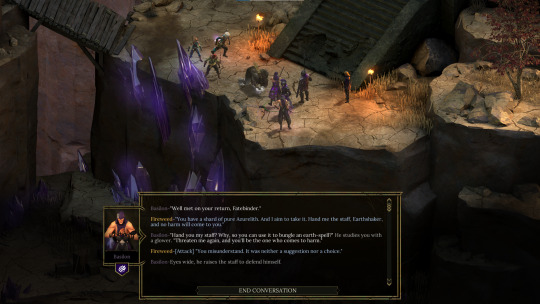
Hey, remember how she went through all that trouble to spare your worthless life? Yeah, she really doesn't know why she bothered! You know what will definitely make her feel better? Killing things!
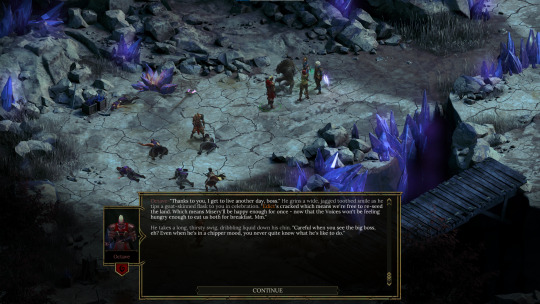
How much time did any of this even buy her?
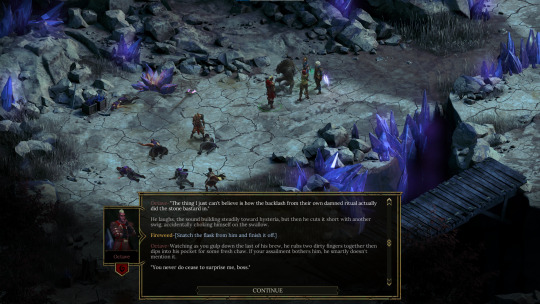
Really? You're surprised she needs a drink?
Lantry was two-timing his guild on orders from Nerat for decades. No wonder he's always on so many drugs now, after that all blew up in his face.
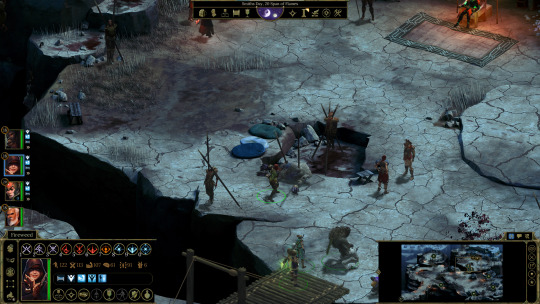
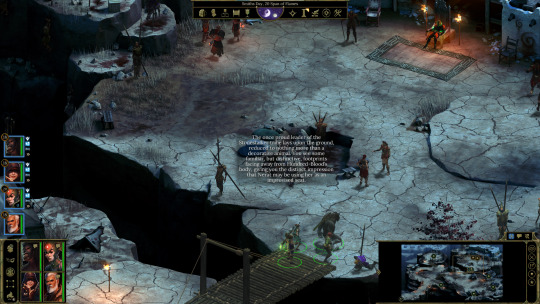
This isn't fun anymore.
TGEK's LP describes the Chorus route as being a story about the folly of thinking evil means can be used to achieve anything but evil ends. That's accurate enough for a one-liner summary, I think, but what I'm getting out of this is something a lot less... dualistic. After all, the rebel path still sees you using some evil means, albeit less than usual, and if you play your cards right there you can achieve ends that are, if not unambiguously good, at least pretty clearly better than the alternatives. For a time, anyway. But that's another point where I differ from TGEK, and that's a whole separate thesis.
More to the point... what exactly does it mean when I say that the Scarlet Chorus is evil? That sounds like a stupid question, I know. Their atrocities aren't hard to list, since they keep them on full display. Just on the face of it, they are obvious, almost generic Chaotic Evil. But that's exactly the trap! Compared to the Disfavored, they seem honest about what they are, and in a way, that can be freeing. "This is war. Try to enjoy it," as Verse says. Besides, many of their more obvious transgressive tendencies are things that a certain kind of person might find outright appealing.
But there's a deeper darkness that, as usual, traces all the way up to Kyros. There's a reason Nerat is a many-faced monster of flames and voices, and as with all Archons, the reason for his existence impacts everything he touches. When he says that he's loyal, not only does he mean it, but he means something very specific by it. Like Bleden Mark and unlike Tunon or Graven Ashe, he knows exactly what Kyros really is. Unlike Mark, he's fully committed anyway. Kyros doesn't stand for anything at all beyond her own power, so true loyalty doesn't mean following her laws or fighting for her glory, but rather being subsumed by her every whim. As below, so above. Nerat's own soul got eaten a long time ago.
Most everyone has something they hold sacred, something that it would shatter them to violate. Sure, the specific thing that broke Nerat was a violent betrayal of his blood family, but that's just flavor. Verse loved her Fury sisters and is a wreck about what she did to them. Fireweed was fiercely proud of her connection to the Beast tribes, and now she's gone and used it as a profane bargaining chip. The Chorus will get you where you live. Like Kyros herself--the truth of her that Nerat sees--it demands nothing less than complete self-annihilation.
In the end, Fireweed does more or less get what she wanted.
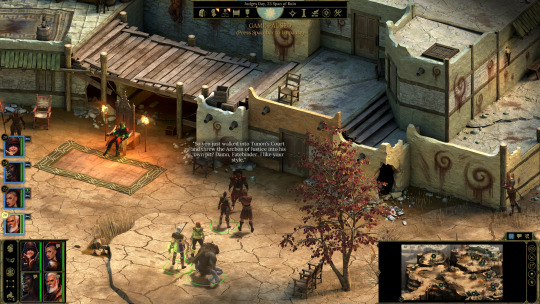
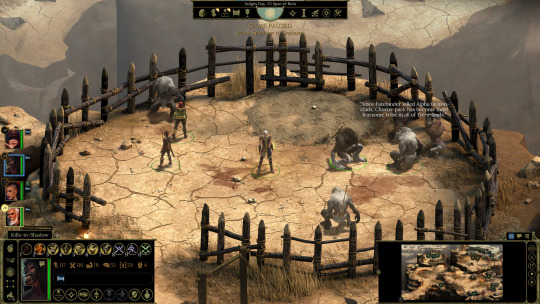
And yet, it kind of feels like a farce. A bad parody.
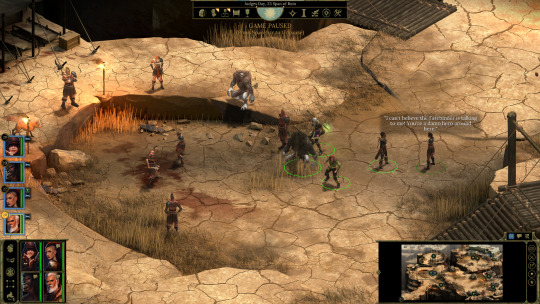
Really? That's the word you're going with?

It... could be worse. Quite a lot worse. She did what she could, right? And who's to say there was ever a chance it could have been any better?
(There was. She missed it two years ago, back during the conquest, when she was pettily abusing her power as a Fatebinder to work out her grudge against the Disfavored. She murdered the Queen of Apex because the Chorus thought it would be funny and the Disfavored were against it. The transgressions that don't matter to you can still alienate you enough to bind you into committing the ones that do.)
2 notes
·
View notes
Text
The thing about Undertale that intrigues me the most is that every character is both likeable and dislikeable. None of the characters are entirely bad, but none of them are entirely good, either.
I can hear you shouting, "But Toriel! What about Toriel? Goat Mom did nothing wrong!" Well... Toriel is, imho, the most unambiguously good character in all of Undertale, with the possible exception of the Human Child. She's unceasingly kind and generous, it's almost impossible for her to kill you in her boss fight, and she desires nothing more than your safety. Going off that last point, though, I find Toriel is a lot like Marlin from Finding Nemo. She's overprotective to a comical extreme. Of course, there's a good reason for this behavior. When I first played the game, though, I found her mollycoddling excessive, to the point where I was almost grateful to leave her behind and escape through the basement! Not that I don't love her, because I do, she's so sweet and funny, and I felt horrible when I accidentally killed her; but Toriel has flaws, and she's not just a one-note maternal figure. And that makes her no less loveable. (Side note: Toby Fox originally planned to have you kill Toriel at the end of the Ruins. He changed his mind and created the SPARE system instead. But I wonder if Toriel was intentionally made smothering to make it easier to off her?)
I'm not gonna discuss Flowey because we all know why he sucks, and I can't say anything that hasn't already been said about his good side.
Papyrus, Papyrus, Papyrus... I love this stupid skeleton himbim. (Why is he a himbim, do you ask? Well, he fits the himbo criteria, but literal skeleton-bodied individuals cannot be considered traditionally handsome.) If he wasn't "pure of heart, dumb of ***", he would be utterly obnoxious. Case in point: his egoism. Papyrus thinks he's the greatest. However, what makes him so lovable is that he thinks everyone else is also the greatest (the "pure of heart" aspect), and that he's really not that great (the "dumb of ***" aspect). Papyrus can be grating and loud and all that, and yet everybody loves him. I have yet to hear tell of anyone who dislikes Papyrus. (Is it because he's probably neurodivergent?) It's interesting how we as a fandom don't really discuss the downsides of Toriel and Papyrus. (Again, not that I don't love them! I do!)
Ah, sans. Finally some good comic relief character. He's a very nicely three-dimensional character. I'm no expert on him, but I will say that his depression doesn't completely excuse him from inaction. There's enough talk about sans to fill a novel or two so I'd suggest consulting another source for more info.
Undyne. Probably the first character (aside from Flowey) whom you truly view as a bad guy. And she has her bad side for sure. She's one of only two Normal Route bosses who will not hesitate to kill you. (Asgore never kills you unless your health is at 1 point.) I understand why she's justifying killing you, a small, possibly harmless child, because she thinks it's the only way to free her people and doesn't have any reason to believe otherwise. But, still. I will say that she's the most human of all the monsters (again, besides Flowey) in that she exhibits the most traits of one: DETERMINATION and cruelty.
Okay full disclaimer I believe that Alphys did nothing wrong and I love her and would die for her BUT. But. My friend has argued for why she kind of sucks, and (though it pains me) I don't disagree. Alphys is basically anxiety given bodily form, and she embodies all the negative parts of anxiety, too. Like the Avoidance Spiral. She screws up, she's afraid of what'll happen if people find out, she hides it, people start getting concerned, she's even more afraid, she avoids it, the problem gets worse, she continues to push it away until the problem has grown too big for her to handle but she refuses to let anyone else help her because having other people know she failed is the last thing she wants. The Avoidance Spiral sucks. And with a problem this major, too; no wonder she contemplates and possibly commits suicide. (Interesting side note: the two Normal route bosses who show you the least mercy are the two who, when killed, lead to Alphys's death.) Also, she manipulates the Human Child without a second thought and never apologizes for it. That's, uh, not great. She needs therapy badly. (Another side note: Alphys is the best-handled instance of mentally ill quasi-villainy in video games I can think of. The only others I can think of are Nathan Prescott and Josh Washington so the bar is not high but I digress. Fun Fact: all those games were released in 2015!)
Mettaton has the most unambiguously rotten personality of the bunch (yet again, aside from Flowey). He's breathtakingly self-absorbed, neglected his own cousin, and is downright abusive to his employees. What redeeming traits does he have? Well, uh... he's a loyal friend to Alphys? Ok yeah that's all I can think of. He's extremely entertaining, though, which is probably why more people don't hate him.
Yes, I know, Asgore is a war criminal, but he's also very soft. And I think that sums him up pretty thoroughly. (Asgore: I have done many things wrong in my life, often. Me: I know this, and I love you.)
TL;DR none of the Undertale characters are perfect, and it's not entirely hard to find a reason to want one or the other of them dead. Does that go against the message of the game? Very much so. Does it make the characters any less lovable? Not at all. Should we give more thought to them all being so lovable despite their flaws? Ab-so-lutely.
#undertale#ut#toriel#flowey#papyrus#sans#undyne#alphys#mettaton#asgore#long post#meow rambles incessantly again#neutral route spoilers#uhhhhh ask to tag
33 notes
·
View notes
Text
Sorry I haven’t been around here much lately! The last few weeks (/months, really) have been rough for me, but I’m feeling a bit better at least for now. For now I’ll just drop some overdue thoughts here on some of the things I’ve been watching since I finished Utena:
Princess Tutu
I found Tutu to be a really sweet and charming show with a ton of heart, but I'm also sad to say that I don't think watching it straight after Utena did it any favours for me. Utena portrayed the same kinds of themes around breaking out of predefined narratives in a way that personally hit home for me a lot harder, so Tutu ended up feeling a bit like a watered down version of the same ideas to me... Which is a shame because I do still think it's a really cool show with a lot to like about it! It's visually and aesthetically gorgeous, I adore its whole cosy meta-fairytale atmosphere and the ballet theme and the whole general feel of the show a lot - it just didn't end up leaving that much of a lasting impression on me in the end. I may well come back and revisit it some day, because I feel like I'd probably get more out of it coming in with a clearer idea of what to expect and without Utena's shadow unfairly hanging over it.
For the characters, I loved Ahiru and Fakir! They were both so endearingly earnest and I really liked the respective directions they ended up taking both of their character arcs and their relationship (Fakir passionately rewriting the story to be about Ahiru's bravery and courage at the end made me cry so hard! That's like, the exact kind of individual heartfelt expression of love that hits straight to my heart when it comes to fictional couples, waaaah...)
Mytho and Rue were a bit harder to connect with for me; I felt like I couldn't really get invested in Rue's feelings for Mytho for the most of the show since the backstory around them wasn't revealed until the very end. (I did like Ahiru and Rue's relationship quite a bit, though! That sort of feeling of the narrative artificially pushing them into being enemies when they really could have helped each other as friends was well done.) On Mytho's end I just never clicked at all with the whole raven blood subplot that seemed to dominate his character in the second season, unfortunately. I couldn't make it meaningfully connect for me, even though I had quite liked him as a character in the first half of the series (even in just my generic "hnng cute boys struggling with the idea of having feelings" way). I'd be interested to see on a rewatch whether those two would work better for me having a better idea of where their trajectory was going from the start, since I felt like I didn't really "get" what they were going for with their relationship or how I was supposed to be reading them until the very end (I'm slow okay).
Steven Universe
What an absolutely lovely series! I've been wanting to check this out for a long time, and I'm glad I finally got the chance because it really is excellent. I totally fell in love with the whole Crystal Gem family, and the balance between them all having their own personal issues to deal with while still being able to draw love and support from each other was done really well. I really loved the handling of Steven's PoV in the first couple of the series especially for how they handled his growth around coming to understand that his parental figures are really flawed people who have a lot of baggage to deal with, but also without framing their personal problems or their relationships with each other as being at all within either his power or responsibility to "fix". Instead, his moments of growth are more about more consciously registering the burdens they're under and making those little gestures to ease them wherever he can, like consciously showing appreciation for their parenting efforts with the test, or giving Amethyst more time to vent things out with her friend when she's stressed out instead of asking her to take him home right away. Likewise, on the gems' end, we really get the sense that e.g. Pearl's love for Steven is real and valuable and "saves" her in a very real sense, but also that it's not going to ever fully erase her depression or her grief over losing the life she had with Rose before and that that's okay.
I would say as the show went on, it felt like it lost some of the grounded and occasionally harsh nature that originally drew me to it - the first couple of seasons felt like they had a sort of constant legitimate tension in the background with the gems trying hard to keep things together in a hard situation in a way that still obviously had its cracks in it, and a sort of acknowledgment that "maybe not everything will be okay, but there's still a lot of good in the world and in our relationships that's worth living for", which I appreciated. Whereas I felt like they moved a bit more towards unambiguously positive resolutions as the show went on, with a bit less of that willingness to leave things "unresolved". (Of course the show still has a lot of those moments, like the reveal of Rose's past in particular, but even then I wished that the fallout from the reveal and its lasting impact on the gems was given more time and weight than it was.) That feeling culminated for me in the finale of series 5 and the way the plot with the diamonds was resolved, where it felt like the show pretty much parted ways with reality entirely and fully embraced a kind of ideal fantasy positivity.
But I don't think that's necessarily a totally bad thing, either - it's still a very genuine and heartfelt kind of positivity that can be hard to find in narratives as unapologetically queer as SU is (especially in media targeted at young kids!) and I'm sure a lot of people really need that gap filled in their lives, so I can't really bring myself to resent it overall. The characters remain as endearing and lovable as ever, the show still made me smile from beginning to end, and all in all I have nothing but great appreciation for all the important ground it's willing to tread as a kids' show touching on a lot of extremely relevant contemporary issues in a positive and responsible way. It honestly makes me feel really happy and hopeful to think of kids getting to grow up with a show like this! So while I might personally have ended up resonating more with the show if they'd taken a different direction, I feel like I still have a lot of respect and understanding for the route they did end up taking, too, and I'm glad to have experienced it.
Mob Psycho 100
I thought this was a very cool and interesting show! As "deconstructing shounen tropes" series go, I feel like this one successfully hits a unique sort of sweetspot for me in the way that, rather than brutally tearing apart shounen conventions out from the roots (which is also something I can enjoy a lot when it's done well!), it's instead focusing on taking a lot of the genuinely positive ideas that draw people to shounen - the ability to overcome adversity through personal growth and "the power of bonds/friendship", positivity in the face of despair, and so on - and re-examining them through a more grounded context that asks "Okay, but what does that actually look like in the real world?" Because, you know, it definitely DOESN'T look like people with magical god-given superpowers blasting through everything that challenges them with the sheer force of their specialness and their pre-assigned role as the "main character", right?
So I was really impressed by Mob as a series for not only being so thorough about deconstructing that (to the point that the voice encouraging Mob to use his powers more and be a super special hero is an outright "devil on the hero's shoulder" kind of character!), but also for going that extra step to examining what real positive growth actually DOES look like. I felt like the series did a remarkably insightful job overall (especially in the second series) of sort of gently but firmly differentiating "real growth" from "shounen growth" in that sense. I really loved those little touches like the Emi episode, where the viewer is effectively led to expect a moral about how "people will like you more if you act more genuine and be yourself!" - but then the show very deliberately switches gears to the idea that trying to be more genuine is already worthwhile in and of itself, just because you're living in the world with a more conscious awareness of what's important to you and standing up for the things you care about, and how that authentic way of living can inspire other people and have a positive impact on them too.
And similarly, I absolutely love Mob and Reigen's weird, messy, problematic relationship being the emotional centrepiece of the series, because it's the exact opposite of the kind of friendship you'd expect to be centred in a "POWER OF BONDS!!" themed show, but that's also why it just... really really works! It's such a humble and near-accidental and flawed and limited connection, and I love that Reigen is also allowed to impact Mob in negative ways and have selfish motivations and be unambiguously portrayed as a genuinely pathetic and terrible person and a bad influence on him too, and that the show doesn't remotely shy away from that - and yet somehow it still absolutely shines through that both of them would be worse off without each other, that the "power of their bond" really has changed them both for the better as people. Not through any incredible magic connection, but just through those little moments where they save each other through things like Reigen telling Mob "It's okay to run away", or Mob telling Reigen "You're a good guy".
Because the show is so upfront about the limitations of their "bond", it really does make the emphasis on its positive impact and how fortunate the two of them are to have been influenced by each other really work and have value, I think - because it comes across as that kind of approachable, recognisable "miracle" that really can and does happen in people's daily lives. It doesn’t claim to be a perfect friendship, or to have the capability to fix all their individual problems just by existing, but it does still come across loud and clear that they’ve been a genuinely positive force in each other’s lives. I definitely came away from it with a greater appreciation for those little chance encounters and humble relationships that have helped me and shaped me as a person! On the whole, I'm sure the show isn't for everyone, but I would definitely recommend it to anyone who enjoys shounen as a genre at all, because I feel that it really works as a remarkably critical and self-aware yet loving celebration of the spirit behind those kinds of stories.
12 notes
·
View notes
Text
Two Birds of a Feather
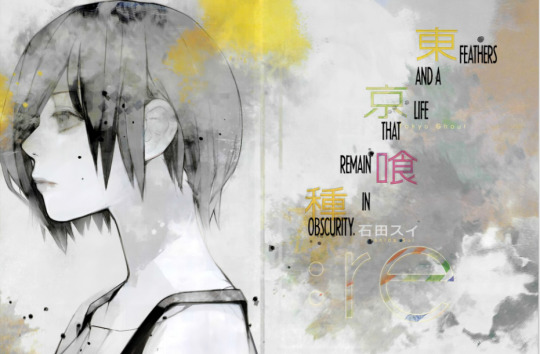
So this cover page was published with “134″, and at the time I thought it was rife with meaning. Which is a little strange because the caption is not something I’ve seen discussed. So let’s discuss it.
Feathers, and a life that remain in obscurity
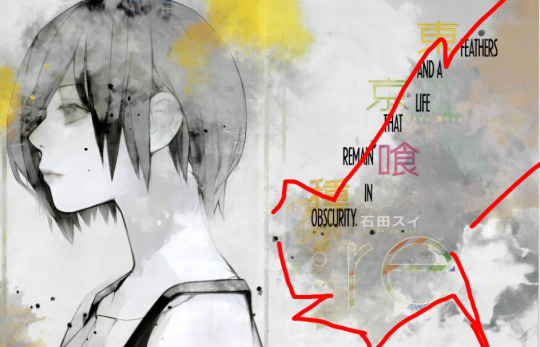
The first part feathers, is rather easy to decode. Ukaku means feather red. It’s a reference to Touka’s Ukaku, which has always symbolically been depicted as wings. Even in the picture itself, there’s a splash of paint suspiciously in the shape of wings emerging from just behind her back.
This technique has been used to represent Touka’s ukaku wings multiple times before, most notably in the first Tokyo Ghoul opening.
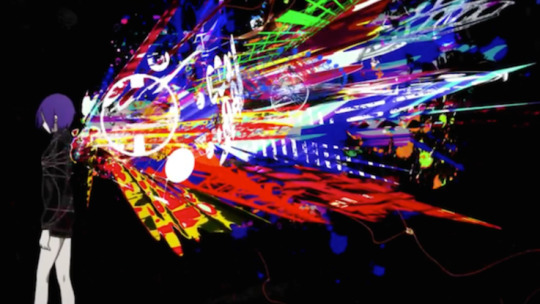
Not only are wings a common artistic depiction with Touka’s character, they also have special regards in the meaning to her arc. As I mentioned [x] here a long time back, when Touka was drawn with one wing it was a sign of her former place in the world being at her brother’s side both of them using a combination attack with only one ukaku wing. Therefore when Ayato left, it also became a sign for her loneliness and the missing half of her brother.
Whereas a Touka with Two Wings such as the one depicted in “Spreading Wings” had matured to the point where she could accept that Ayato would come back on his own, and Ayato’s life was not merely about her own loneliness. Therefore she was capable of standing on her own and using both ukaku wings in combination to protect others.
There’s an additional layer of meaning to the wings though, as often symbols can come to stand for more than one thing. When Ayato leaves Touka, he’s depicted with two wings on the back of his shirt. As pointed out by Cor [x].
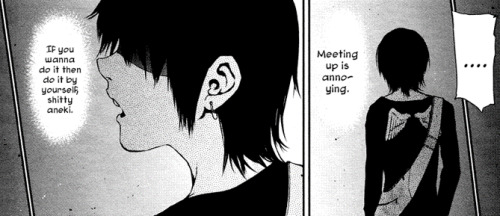
When Ayato and Touka reunite on the roof and have a battle of ideals, they fight specifically with their ukaku, one vs two. Ayato gaining the edge in the fight decides to rip apart her kagune by biting at the kakuhou. Not only is the line he drops significant, but his reasoning for doing so.
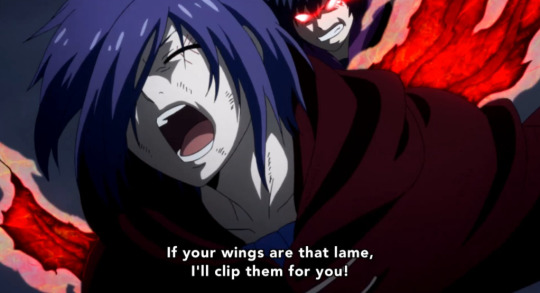
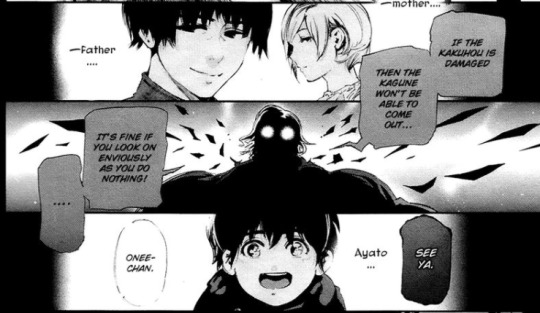
Ayato specifically attacked her Kakuhou so Touka’s kagune would be so damaged she no longer would be able to participate in the fight. As Kaneki pointed out later, Ayato’s intention has always been to protect Touka. It’s through Ayato’s own emotional immaturity and childish piques of violence though we see how possessive this form of protection can take. Ayato would rather his sister be crippled, then have the agency to walk into the fight for herself, because her making that decision for herself means he might lose her.
Touka is the victim of that attitude but she reflects it in a way too. As Ayato is breaking his sister’s legs so that she cannot walk away from him, Touka mourns at the same time, why both her mother, father, and ayato himself all walked away from her. Touka remembers explicitly, Ayato leaving with two wings on his back. Ayato having two wings and the ability to fly, also implicitly means to her that they might fly away from her.
Wings are independence and freedom, Ie the ability to make decisions on your own and stand on your own. Freedom is exactly that though, a lack of attachment, it means you might fly away. Both of those meanings are embodied in Touka’s constant depiction with wings, it’s even basically spelled out by Kaneki during their talk.
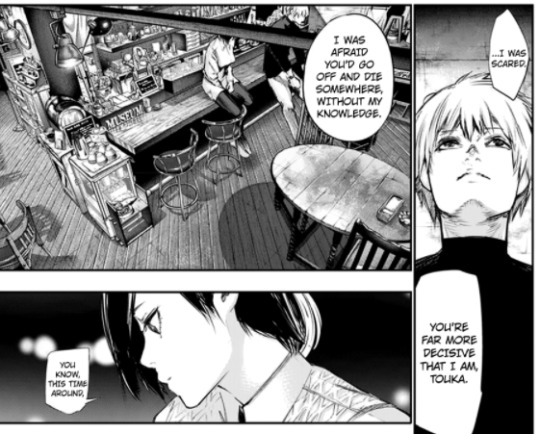
Kaneki’s remembrances of Touka are pretty much all with her back facing him, and either her ukaku or the marks left from wher she used them prominent on her back. He admires her decisiveness and independence, but at the same time Kaneki fears that these qualities mean Touka might leave him behind.
How exactly do you compromise on this then? What is the way to allow people to be full complete people, but at the same time ensure they will stay around you.
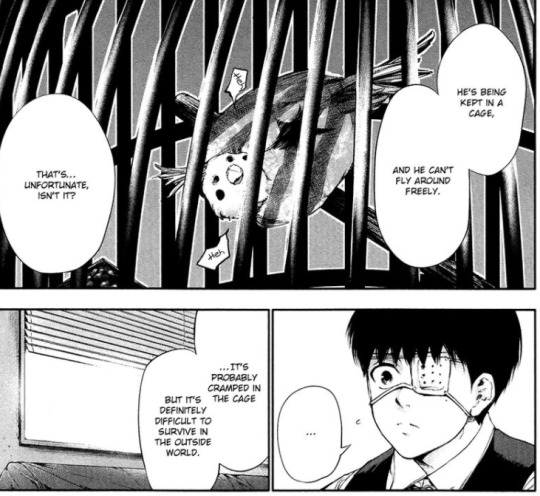
A bird’s wings will stay perfectly in tact inside of a cage, but at the same time they won’t be able to fly away. It’s probably better that way though, because the outside world is too terrible of a place to survive in.
The fact that Touka stares so long at Loser after being unable to see the beauty in her own wings, makes it pretty clear that she sees herself in Loser. A person with wings and power, but unable to live the life she even remotely wants because the world is so dead set against her existence. It’s not even that Touka just like every other ghoul has is forced to hide herself and her identity or be hunted down, but a step beyond that as Arata intentionally conditioned Touka to believe she had to participate in specific self harming behaviors in order to pass for human [x].
The arc that preceded this chapter with Loser specifically illustrated the negative consequences those actions have on Touka, as because she insisted upon eating the entirety of Yoriko’s food to appear human and normal she was too weak for most of the fight with Tsukiyama and could barely step in to protect Kaneki.
The temptation every character faces this arc which is specifically about leading a rebellion to smash the cage that restricts ghoul kind in order to create a world where they can lie more freely, is that it might simply be easier and less risky to accommodate to the cage rather than fight it. As @undergroundsky quoted so elegantly:
“Man is a creature who gets used to everything, and that is the best definition of him.”
Or if you want to go the route of Milton rather than Dostoyevsky,
“ Here we may reign secure, and in my choyce
To reign is worth ambition though in Hell:
Better to reign in Hell, then serve in Heav'n.
A propagandist cry from Lucifer to all of his followers when they mourned the loss of their former glory, and their current destitution in a cold and unforgiving hell when they once lived happily among the clouds. Easily comparable to the ghoul’s current position in the 24th ward, Lucifer cries out it’s better here where we are miserable because at least we have chosen that misery for ourselves. It’s an illusion of agency where there is none.
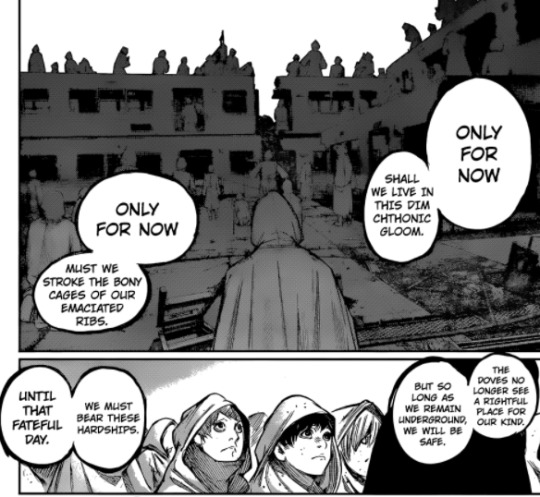
Kaneki frames the slow starvation of the ghouls not to be desperation, but to be a noble sacrifice, a worthy one that will lead to future prosper. Again too, he makes it sound like a choice that they are stuck in this prison.
Paradise Lost is a religious parable, the reason it makes such a sympathetic antagonist, a propagandist and speaker of out Lucifer one of the most unambiguously evil figures in christian mythology is because it’s meant to show how tempting sin is. Milton was not attempting to make a sympathetic figure out of Satan, but rather to show how tempting the path of sin can seem. Human beings are tempted to remain in misery with their sin precisely because they do not want to challenge their believes and accept they are wrong. They would rather futiley stay where they are and attempt to make a paradise out of hell itself, then reach out for something better.
This is the temptation every ghoul hiding in the 24th ward faces, to simply stay in the literal garbage dump living like rats because there it is “Safe”. To simply bear the hardships out forever and learn to accommodate them, rather than fighting for a rightful place in the world and risk losing more than you already have.
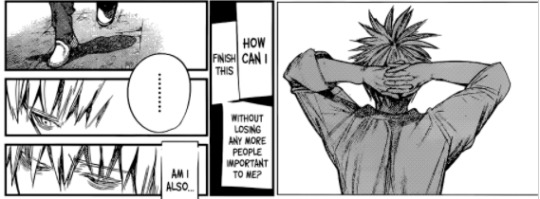
However, it is also an issue that has heavily been a part of Touka’s character arc since the start. Touka and her flaws have always risen up from this conflicting need she has to first be true to herself and her own strong, decisive but temperamental nature, yet at the same time follow the urge to conform something that has been forced on her since her childhood by Arata. Not that Touka’s urge to conform is a bad thing, she has a rightful place in society. If Mob Psycho 100 has taught anything, it’s that there’s nothing wrong with wanting to just be a productive member of society. At the same time though, the origin point of Touka’s need to conform is the problem itself. It comes from a certain belief that if she hides well enough, that she acts peacefully enough, she will be passed over and her loved ones will stay around her. It’s because she believes the comfortable world that humans have built for themselves belongs exclusively to humans, and exists only for humans, something inaccessible to a ghoul that pushes Touka to conform to the point where she commits acts of genuine self harm.
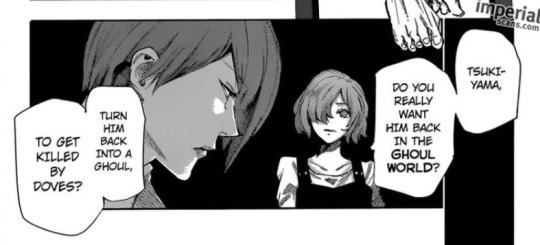
Touka at this point would probably saw her own legs off if it meant fitting into the hole. In the same way she reflects Ayato’s own previous actions of breaking her legs so that she did not wander too far away from him, but in this case she does so to herself. Perhaps that is why people in the fandom have such trouble spotting Touka’s flaws, because while every other character in the manga lets their issues spill out and harm one another, most of the harm Touka does is to herself.
As this meta points out it’s always been a long running theme with Touka’s character, her passive self harm [x]. However, I would like to make the point that Touka has far from quit this behavior in Re:
A life in obscurity
So we see Touka’s response to living in a world that demands she live in obscurity, that is to obfuscate herself. You can see the lesson she has learned and put into practice since the end of Tokyo Ghoul, repeatedly in Re: but this scene is the one that makes it the most clear.
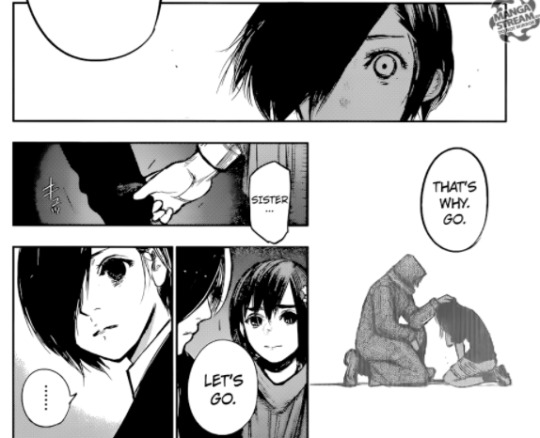
Compare her reaction back then to now. Touka cried and cried, threw a tantrum, but eventually accepted that she had to move on and make the sacrifice, ot now where she accepts it almost immediately with only one pained look.
Of course Touka has matured since then, but is it really somehow more mature to accept the death of your uncle immediately without shedding a tear? Perhaps it was the situation that called for her not to cry but to move on, but we see Touka handling another death without even expressing a single tear, bit of anger, or frustration at the difficult decision she had to make.
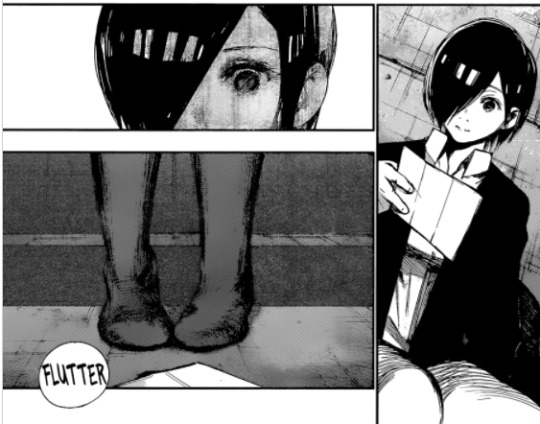
It’s not that Touka made the decision she had to, but rather that we see none of the emotions behind the decision that she made. Touka might as well have been completely fine, because she got married and threw a massive party immediately after receiving the news that her best friend would be executed because she herself was a ghoul.

Yoriko says this explicitly last chapter, that Touka’s tendency is to bear everything with a grin. But that’s a bad thing, because she should not have to deal with those emotions alone. Yet, Touka is married to Kaneki, and she cannot even get upset at him enough to confront him over a pretty significant lie he told.
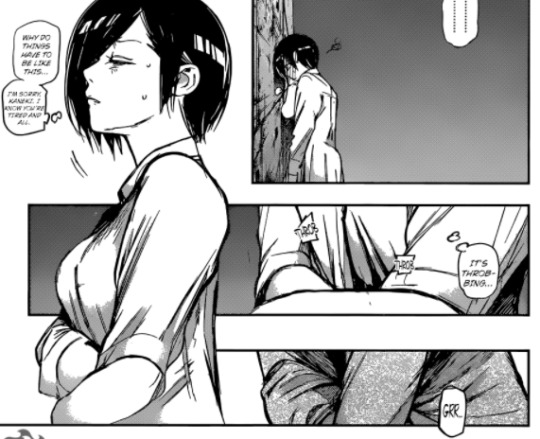
Touka’s concern when Kaneki leaves the room after almost discovering her pregnancy, is not her own painful pregnancy but the fact that Kaneki himself is tired and she does not want to add onto the pile.
Perhaps the self harming nature of Touka’s behavior isn’t clear enough yet with Touka having to literally eat human food again and starve herself in order to have a baby, which has always been the symbol of Touka harming herself in order to try and fit in with society, let’s draw this comparison then.
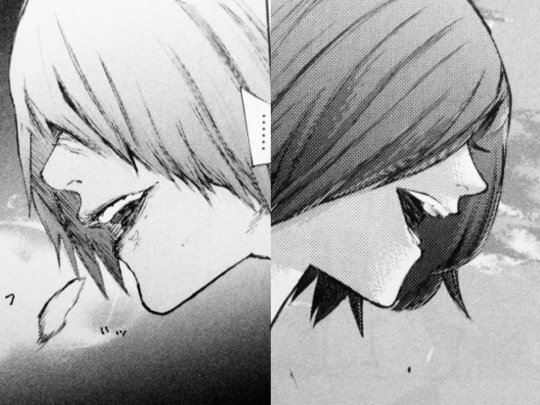
Touka and Mutsuki make similar faces while their faces are completely obscured, but for opposite reasons, and facing in opposite directions.
This meta [x] points out that Mutsuki on the cover of volume is deliberately mirroring Touka in envy of her position at Kaneki’s side, and is in a way trying to become her.
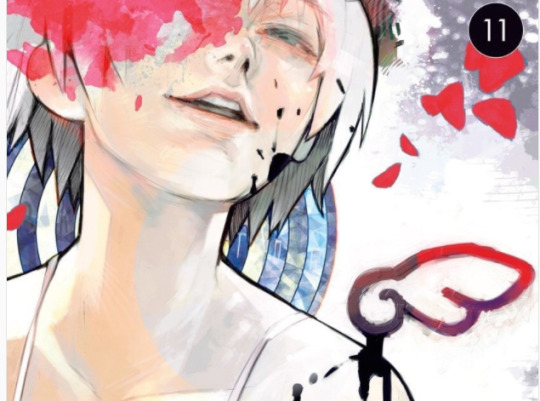
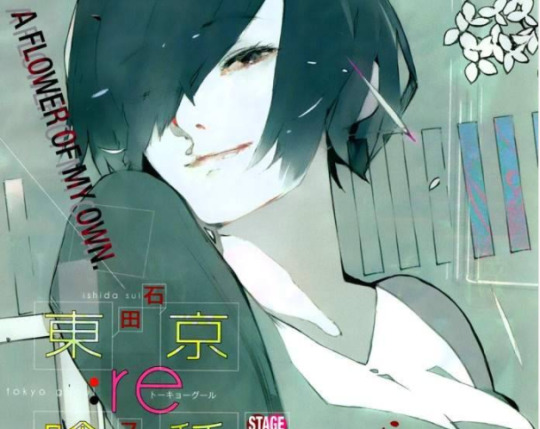
I’m going to look at this angle from a different angle though. Rather than comparing if either Mutsuki or Touka is truly ‘healthier’ or ‘better’ in regards to the way they love Kaneki, isn’t it extremely unhealthy that Mutsuki thinks that if he sacrifices of obscures some part of himself that Kaneki will come back to him.
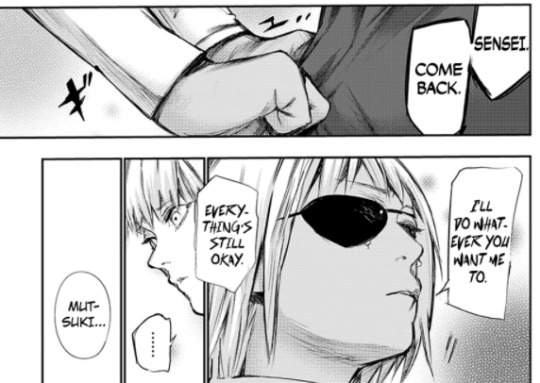
Does Mutsuki’s actions in believing that everything will be okay if Kaneki simply comes back to him, reflect Touka’s in a way? A less put together way?

Mutsuki too, is repressing a significant amount of his emotions. Remember, Mutsuki was caught on the island and severely traumatized and then immediately put back on active duty. He was never even given the slightest oppurtunity to mourn what had been done to him, and look how Mutsuki acts as a result. He’s completely confident and put together one moment, and then in the next he breaks down crying, screaming, and wailing like he’s in pieces.
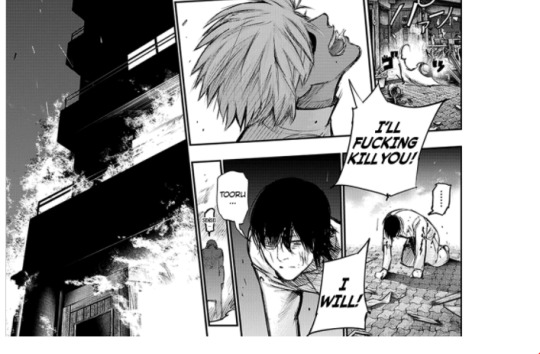
For all the confidence Mutsuki displays in this arc, whenever things go slightly away from plan he always seems one step away from a similiar breakdown. In the same way, the Oggai are able to be vicious one moment and then cry for their mothers like actual 11 year old children would the next.
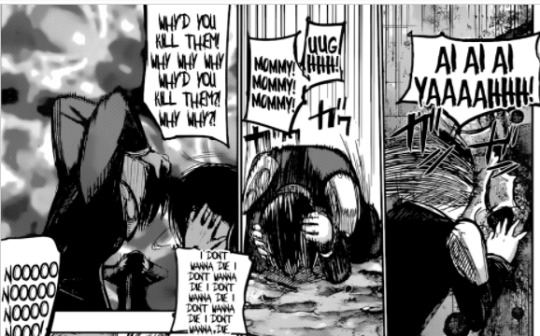
In a way Mutsuki is acting similiarly to Touka, he’s ignoring all the mourning he might do for his own situation and instead trying to focus entirely on Kaneki instead. Mutsuki used to act like a full person who thought about his family, his little brother, and even the other Quinx. Then suddenly Kaneki came in to encompass all of those tragic feelings.
It’s not that Mutsuki and Touka only care about Kaneki, but rather that Kaneki is simply the biggest symbol for all of the things they had lost in their life. As Kaneki, rather than the others who were taken away, inserted himself in and then willingly departed from them. So then it seems like Kaneki is the most important thing to either character, when he isn’t.
And I do think the narrative is trying to trick you into thinking that Kaneki is the most important thing to Touka. The only time she explicilty mentions the purpose of Re: it was to wait for Kaneki’s return in case he might one day need to. Kaneki’s decision at the end of Tokyo Ghoul, her resolve was that Kaneki would find his way home one day.
So Mutsuki serves as an extreme to show how unhealthy Touka’s own behavior of stifling her emotions will be. Mutsuki who lies and obscures about himself so well that his personality is cut neatly into halves. The extreme, but Touka somehow practicing this behavior more passively does not make it any healthier.
If Kaneki is unable to move past his grieving for the people he loses and effectively move on from then, then Touka is the opposite. She moves on right away without ever allowing herself to grieve, and it’s a behavior pattern she’s been stuck in since the end of Tokyo Ghoul. There is more to living than simply losing.
Touka won’t be able to fight for the right reasons until she comes to accept that fact, unless she truly wants to live a life in obscurity, if she thinks her child really will somehow be happy living in the dumpster fire that is the 24th ward as long as Touka and Kaneki are still around them and together.
171 notes
·
View notes